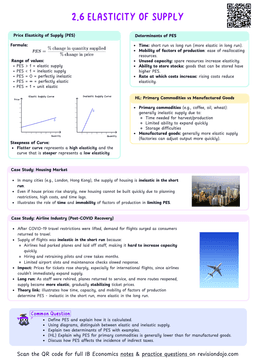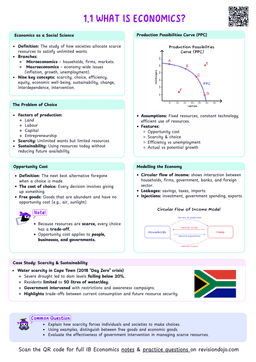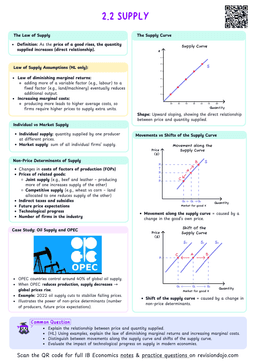- Abuse of market power refers to situations when firms do anti-competitive practices to limit competition and increase their personal benefit.
- As a result, due to the lack of competition, the efficiency and the motivation for innovation falls, which affects the allocative efficiency.
- Hence, governments need to intervene to prevent or correct these abuses of market power.
- Those interventions can include:
- Legislation and Regulation
- Government Ownership
- Fines
Legislation and Regulation
- Many countries have a policy called competition policy.
- This ensures that the firms in the country do not engage in anti-competitive behavior.
- These policies can include punishments if such actions are detected, such as:
- Breaking up a firm into a few smaller firms.
- Unbundling the firm's products.
However, it may be challenging to prevent this type of behaviour with legislation, because:
- There is no clear boundaries or defined acts which are considered to be anti-competitive practices and what is not such practices.
- Therefore, there could be different views on this matter, which can make it difficult to intervene and penalise.
- Some governments believe that government intervention may only further disturb the market and choose not to intervene.
- Some anti-competitive behaviours such as collusion, may be hard to prove as they are done in private and not revealed to the public.
The Microsoft Antitrust Case (United States, 1990s–2000s)
During the late 1990s, Microsoft dominated the personal computer software market, particularly with its Windows operating system and Internet Explorer browser. The company faced allegations of leveraging its market power to engage in anti-competitive practices that harmed consumers and competing businesses.
Microsoft was found to have bundled its Internet Explorer browser with Windows, making it difficult for consumers to select alternative browsers. It also reportedly used control over the operating system to suppress competition in the browser market, sidelining rivals like Netscape Navigator.
In 1998, the U.S. Department of Justice (DOJ), along with 20 state attorneys general, initiated an antitrust lawsuit against Microsoft. The government argued that Microsoft had breached antitrust laws by using its market dominance to hinder competition and sustain its monopoly.
The case culminated in a settlement in 2001, requiring Microsoft to adopt several regulatory measures:
- Separation of software components: Microsoft was mandated to share its APIs with third-party developers to encourage competition.
- No forced bundling: Microsoft had to allow computer manufacturers to sell Windows separately from Internet Explorer, increasing consumer choice.
- Oversight: Microsoft was placed under government oversight and required to provide regular reports to ensure compliance.
Although Microsoft avoided a breakup (initially proposed), the intervention reduced its anti-competitive practices. This case set an important precedent for government regulation of monopolies in the technology sector and is frequently cited as an example of how legislation can curb abuses of market power.
Government Ownership
- In markets where essential services are provided, governments may supply these services directly to prevent private monopolies from emerging.
- Further, government ownership can bring greater stability to the market.
- They can also provide these goods and services at the socially optimal level, preventing misallocation of resources.
However, as the government does not operate in a competitive setting, they:
- May not be very efficient in providing the goods and services.
- Will not have an incentive to innovation or do research & development.
- Their decisions may be swayed due to political influences.
Nationalization of British Rail (UK, 1948)
Prior to 1948, the British railway system was controlled mainly by private companies, many of which held significant market power. These companies were criticized for exploiting their monopolistic positions by charging high fares, offering poor service, and prioritizing profits over public welfare.
The fragmented ownership and weak regulation led to inefficiencies, underinvestment in infrastructure, and inadequate customer service. Concerns grew over unfair pricing and the lack of competition in railway transport, leaving consumers with limited affordable and reliable options.
In 1948, the UK government nationalized the rail industry through the Transport Act of 1947, creating British Railways (later known as British Rail) under public ownership. The goal was to deliver efficient, affordable, and accessible rail services nationwide.
- Improved Accessibility: Nationalization ensured equitable access to rail services, particularly in rural and underserved regions neglected by private companies.
- Public Welfare Focus: The emphasis shifted from profit-making to serving the public good, with affordable, dependable services and attention to working-class communities.
- Investments in Infrastructure: The government invested in modernization, safety standards, and expanded service coverage.
- Long-Term Effects: Despite later challenges such as inefficiency and underinvestment, nationalization kept essential railway services under public control, curbing monopolistic practices.T
Fines
- Governments often impose fines to discourage firms from engaging in anti-competitive behaviour.
- The financial penalty provides an incentive for firms to remain competitive and avoid such practices.
- Additionally, these fines generate government revenue, which can be allocated to sectors like education or healthcare.
- Even though the idea of fines for abuse of significant market power is not mainly done for the purpose of generating government revenue, it is important to evaluate the possible benefits it can have for the rest of the economy.
- Discussing about its use for developing public goods and necessities can be considered as critical evaluation and can fetch you good evaluation marks!
- As with this case, there are many other concepts where when evaluating, you can bring other economics topics into and discuss the effects.
However, these fines may not always be effective, because:
- If firms earn more money from engaging in anti-competitive behaviour than the costs of the fine, they will continue doing such anti-competitive practices as it is profitable.
- Further, it is hard to calculate the correct fine amount, because each firm benefits in a different way from doing anti-competitive practices.
EU Antitrust Fine on Google (2017)
Background:
Google, the leading search engine in Europe, was accused of misusing its market power to favor its own service (Google Shopping) in search results, thereby hindering competition. The European Commission investigated whether Google’s practices breached EU competition laws by giving preferential treatment to its own service over rivals.
Abuse of Market Power:
Google allegedly manipulated its search algorithms to place Google Shopping at the top of search results while pushing competitors to lower ranks. This limited consumer choice, distorted the market, and risked inflated prices.
Government Intervention:
In 2017, the European Commission imposed a record €2.42 billion fine on Google for violating EU antitrust rules. The fine targeted Google’s abuse of dominance, specifically the unfair promotion of its own service.
Outcomes of Government Intervention:
- Penalty for Market Manipulation: The fine acted as a deterrent, warning other firms against anti-competitive behavior.
- Order to Change Practices: Google was required to end preferential treatment and ensure equal visibility for competing services.
- Impact on Google: Google complied by adjusting its algorithms, though critics argue these changes did not fully restore competition.
Significance:
This case shows how government fines can address anti-competitive practices by large firms. It punished Google while reinforcing the importance of fairness and transparency in digital markets, setting a precedent for future regulatory actions against tech giants.


